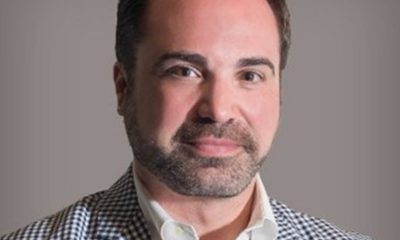National
New report outlines problems faced by LGBTQ+ nursing home residents
Authors recommend supportive policies, training for nation’s 15,000 facilities

A recently published academic journal article by two University of Indiana researchers reports on problems faced by LGBTQ+ older adults living in the nation’s nursing homes and recommends actions nursing homes should take to ensure LGBTQ+ residents are treated equitably and without bias.
The article, entitled “Postacute Care and Long-Term Care for LGBTQ+ Older Adults,” was published Nov. 9 in the peer reviewed journal Clinics In Geriatric Medicine. It is co-authored by geriatric physician Jennifer L. Carnahan, a research scientist with the Regenstrief Institute, which is affiliated with Indiana University’s Center for Aging Research and Andrew C. Picket, an elder care researcher and assistant professor at Indiana University’s School of Public Health in Bloomington. Carnahan also serves as an assistant professor of medicine at the Indiana University School of Medicine.
“Cultivating an inclusive and LGBTQ+ culturally competent nursing home culture means that all staff and clinicians should receive training specific to working with this group and time should be allocated for this to reduce staff burden,” the article states.
It points out that while some older LGBTQ+ adults fear being forced into the closet while in a nursing home, “they also simultaneously fear unwanted disclosure of their sexual orientation or gender identity status, and their autonomy should be respected either way.”
The article says there are more than 15,000 nursing homes in the U.S. that provide rehabilitative and skilled nursing care to mostly older adults. It notes that nursing home residents fall into two distinct groups–post-acute care residents who often can return to their own home after recovering from an illness or injury; and long-term care residents who are no longer able to care for themselves. It says that among the long-term care residents in nursing homes, about 50% are living with dementia or another type of cognitive impairment.
According to the article, LGBTQ+ older adults “at a minimum have the same risk of dementia as the general U.S. population, and dementia increases the risk of nursing home admission.”
Among the article’s recommendations is that when new residents are being admitted to a nursing home, whether for short term or long term, “standard practice should be to ask sexual orientation and gender identity questions of every new resident along with other demographic identifiers.” Doing this “normalizes sexual and gender minority status” and can also “help to reduce the invisibility and health disparities” that LGBTQ+ nursing home residents experience.
“For transgender individuals, the personal care received in nursing homes can be supportive, as intended, or traumatic,” the article states. When nursing home staff provide assistance to transgender persons unable to care for themselves, “such as toileting or bathing, they may become newly aware of a resident’s transgender status,” the article says, adding, “If staff are not prepared for such an unintentional outing and how to react in a supportive manner, they may demonstrate microaggressions.” That type of biased reaction can be psychologically harmful for a transgender resident, the report states.
“We think about younger LGBTQ+ individuals and the challenges and risks of their lifestyles, but older adults in this population are often forgotten,” co-author Carnahan said in a statement. “They’ve experienced many health disparities. As these accumulate over a lifetime, we see the potential long-term ill effects of being from a marginalized population,” she says in the statement.
“More and more LGBTQ+ older adults are comfortable being out with their providers, while many living in nursing homes fear unwanted disclosure of their sexual orientation or gender identity status,” Carnahan says. “Their autonomy should be respected either way so they can age in an environment where they feel safe, where they feel comfortable and where they are able to live with dignity.”
The article points to a 2018 survey conducted by AARP, which advocates for people over the age of 50, that found most LGBTQ+ older adults, when considering entering a nursing home, “anticipate neglect, abuse, refusal of services, harassment, and being forced back into the closet.”
The article says this fear of abuse and stigmatization may be related to older LGBTQ+ adults’ experiencing anti-LGBTQ+ bias in their younger years.
“Health care workers across disciplines are not well trained in care for LGBTQ+ older adults,” the article says. “Stereotypes and inadequate knowledge of the LGBTQ+ population are not uncommon among those who care for older adults,” it says. And it says LGBTQ+ residents in nursing homes may also face stigmatization from other residents.
“Training programs that engage nursing home staff in LGBTQ+ cultural competency can remediate staff knowledge and ensure more equitable care,” the article stresses.
In addition to calling for better training, the article includes several other recommendations, including providing legal advice to LGBTQ+ nursing home residents on how best to assign the legal authority to make decisions about their care if they become incapacitated and unable to make those decisions for themselves.
Carnahan said in an interview with the Blade that obtaining legal advice about designating a trusted surrogate to make medical decisions for them if they are no longer able to do that is especially important for LGBTQ+ nursing home residents. In at least some cases, LGBTQ+ people are estranged from their biological families and may have chosen families, Carnahan points out. Without having assigned legal health care power of attorney to someone of their choosing, under the laws of most states, the biological family becomes the entity that a nursing home will go to in making these health-related decisions for all residents, including LGBTQ residents.
The article also provides a list of LGBTQ+-related resources for nursing homes and LGBTQ+ older adults considering entering a nursing home. Among the resources on this list is the Long-Term Care Equality Index prepared by the LGBTQ+ organizations Human Rights Campaign and SAGE, an LGBTQ+ elders advocacy organization. The Index is a document that identifies LGBTQ+-supportive facilities, including residential facilities and nursing homes.
SAGE, based in New York City, arranges for LGBTQ+-supportive training for older adult residential facilities across the country and designates facilities that SAGE believes are LGBTQ+ supportive as “SAGECare credentialed” facilities, which are listed in the Long-Term Care Equality Index.
“It is the case now that in almost all states there are one or more elder care facilities that have been trained throughout our SAGECare program,” SAGE CEO Michael Adams said in a recent interview. “But it’s nowhere near where it needs to be,” he said. “It needs to be that there are welcoming elder care facilities in every single community in this country” for LGBTQ+ elders.
The article by elder care researchers Carnahan and Picket reaffirms Adams’s claim that most U.S. nursing homes don’t have the type of LGBTQ+ supportive credentials advocated in the SAGECare program. The two stress in their article the need for all nursing homes to take steps to train their staff on LGBTQ competency issues.
“Yes, that’s what I would like to see,” Carnahan told the Blade. “I would like more nursing homes and assisted living and even senior communities to embrace cultural competency and embrace the SAGE designation,” she said.
Carnahan said a common impediment to nursing homes providing LGBTQ+-related training is it is sometimes difficult to set aside the time to do that because of the busy and often stressful work involved in operating a nursing home. “Working in a nursing home is very hard work. I’ve done it,” she said.
“What leadership really needs to do is to say this is important enough to me that I’m going to set aside a couple of hours where you don’t have critical duties and they just want you to participate in this cultural competency training,” Carnahan concludes. “And that’s what really needs to happen.”
The journal Clinics In Geriatric Medicine has a policy of not releasing articles it publishes to the public who are not paid subscribers to the journal until one year after an article has been published. Additional information about the topic of LGBTQ+ nursing home residents can be found on these sites from the Regenstrief Institute:
regenstrief.org/article/culturally-inclusive-care-lgbtq-nursing-home-residents/
regenstrief.org/article/carnahan-inclusive-long-term-care-video
The White House
Four states to ignore new Title IX rules protecting transgender students
Biden administration last Friday released final regulations

BY ERIN REED | Last Friday, the Biden administration released its final Title IX rules, which include protections for LGBTQ students by clarifying that Title IX forbids discrimination based on sexual orientation and gender identity.
The rule change could have a significant impact as it would supersede bathroom bans and other discriminatory policies that have become increasingly common in Republican states within the U.S.
As of Thursday morning, however, officials in at least four states — Oklahoma, Louisiana, Florida, and South Carolina — have directed schools to ignore the regulations, potentially setting up a federal showdown that may ultimately end up in a protracted court battle in the lead-up to the 2024 elections.
Louisiana State Superintendent of Education Cade Brumley was the first to respond, decrying the fact that the new Title IX regulations could block teachers and other students from exercising what has been dubbed by some a “right to bully” transgender students by using their old names and pronouns intentionally.
Asserting that Title IX law does not protect trans and queer students, Brumley states that schools “should not alter policies or procedures at this time.” Critically, several courts have ruled that trans and queer students are protected by Title IX, including the 4th U.S. Circuit Court of Appeals in a recent case in West Virginia.
In South Carolina, Schools Supt. Ellen Weaver wrote in a letter that providing protections for trans and LGBTQ students under Title IX “would rescind 50 years of progress and equality of opportunity by putting girls and women at a disadvantage in the educational arena,” apparently leaving trans kids out of her definition of those who deserve progress and equality of opportunity.
She then directed schools to ignore the new directive while waiting for court challenges. While South Carolina does not have a bathroom ban or statewide “Don’t Say Gay or Trans” law, such bills continue to be proposed in the state.
Responding to the South Carolina letter, Chase Glenn of Alliance For Full Acceptance stated, “While Supt. Weaver may not personally support the rights of LGBTQ+ students, she has the responsibility as the top school leader in our state to ensure that all students have equal rights and protections, and a safe place to learn and be themselves. The flagrant disregard shown for the Title IX rule tells me that our superintendent unfortunately does not have the best interests of all students in mind.”
Florida Education Commissioner Manny Diaz also joined in instructing schools not to implement Title IX regulations. In a letter issued to area schools, Diaz stated that the new Title IX regulations were tantamount to “gaslighting the country into believing that biological sex no longer has any meaning.”
Governor Ron DeSantis approved of the letter and stated that Florida “will not comply.” Florida has notably been the site of some of the most viciously anti-queer and anti-trans legislation in recent history, including a “Don’t Say Gay or Trans” law that was used to force a trans female teacher to go by “Mr.”
State Education Supt. Ryan Walters of Oklahoma was the latest to echo similar sentiments. Walters has recently appointed the right-wing media figure Chaya Raichik of Libs of TikTok to an advisory role “to improve school safety,” and notably, Raichik has posed proudly with papers accusing her of instigating bomb threats with her incendiary posts about LGBTQ people in classrooms.
The Title IX policies have been universally applauded by large LGBTQ rights organizations in the U.S. Lambda Legal, a key figure in fighting anti-LGBTQ legislation nationwide, said that the regulations “clearly cover LGBTQ+ students, as well as survivors and pregnant and parenting students across race and gender identity.” The Human Rights Campaign also praised the rule, stating, “rule will be life-changing for so many LGBTQ+ youth and help ensure LGBTQ+ students can receive the same educational experience as their peers: Going to dances, safely using the restroom, and writing stories that tell the truth about their own lives.”
The rule is slated to go into effect Aug. 1, pending any legal challenges.
****************************************************************************

Erin Reed is a transgender woman (she/her pronouns) and researcher who tracks anti-LGBTQ+ legislation around the world and helps people become better advocates for their queer family, friends, colleagues, and community. Reed also is a social media consultant and public speaker.
******************************************************************************************
The preceding article was first published at Erin In The Morning and is republished with permission.
Pennsylvania
Malcolm Kenyatta could become the first LGBTQ statewide elected official in Pa.
State lawmaker a prominent Biden-Harris 2024 reelection campaign surrogate

Following his win in the Democratic primary contest on Wednesday, Pennsylvania state Rep. Malcolm Kenyatta, who is running for auditor general, is positioned to potentially become the first openly LGBTQ elected official serving the commonwealth.
In a statement celebrating his victory, LGBTQ+ Victory Fund President Annise Parker said, “Pennsylvanians trust Malcolm Kenyatta to be their watchdog as auditor general because that’s exactly what he’s been as a legislator.”
“LGBTQ+ Victory Fund is all in for Malcolm, because we know he has the experience to win this race and carry on his fight for students, seniors and workers as Pennsylvania’s auditor general,” she said.
Parker added, “LGBTQ+ Americans are severely underrepresented in public office and the numbers are even worse for Black LGBTQ+ representation. I look forward to doing everything I can to mobilize LGBTQ+ Pennsylvanians and our allies to get out and vote for Malcolm this November so we can make history.”
In April 2023, Kenyatta was appointed by the White House to serve as director of the Presidential Advisory Commission on Advancing Educational Equity, Excellence and Economic Opportunity for Black Americans.
He has been an active surrogate in the Biden-Harris 2024 reelection campaign.
The White House
White House debuts action plan targeting pollutants in drinking water
Same-sex couples face higher risk from environmental hazards

Headlining an Earth Day event in Northern Virginia’s Prince William Forest on Monday, President Joe Biden announced the disbursement of $7 billion in new grants for solar projects and warned of his Republican opponent’s plans to roll back the progress his administration has made toward addressing the harms of climate change.
The administration has led more than 500 programs geared toward communities most impacted by health and safety hazards like pollution and extreme weather events.
In a statement to the Washington Blade on Wednesday, Brenda Mallory, chair of the White House Council on Environmental Quality, said, “President Biden is leading the most ambitious climate, conservation, and environmental justice agenda in history — and that means working toward a future where all people can breathe clean air, drink clean water, and live in a healthy community.”
“This Earth Week, the Biden-Harris Administration announced $7 billion in solar energy projects for over 900,000 households in disadvantaged communities while creating hundreds of thousands of clean energy jobs, which are being made more accessible by the American Climate Corps,” she said. “President Biden is delivering on his promise to help protect all communities from the impacts of climate change — including the LGBTQI+ community — and that we leave no community behind as we build an equitable and inclusive clean energy economy for all.”
Recent milestones in the administration’s climate policies include the U.S. Environmental Protection Agency’s issuance on April 10 of legally enforceable standard for detecting and treating drinking water contaminated with polyfluoroalkyl substances.
“This rule sets health safeguards and will require public water systems to monitor and reduce the levels of PFAS in our nation’s drinking water, and notify the public of any exceedances of those levels,” according to a White House fact sheet. “The rule sets drinking water limits for five individual PFAS, including the most frequently found PFOA and PFOS.”
The move is expected to protect 100 million Americans from exposure to the “forever chemicals,” which have been linked to severe health problems including cancers, liver and heart damage, and developmental impacts in children.
An interactive dashboard from the United States Geological Survey shows the concentrations of polyfluoroalkyl substances in tapwater are highest in urban areas with dense populations, including cities like New York and Los Angeles.
During Biden’s tenure, the federal government has launched more than 500 programs that are geared toward investing in the communities most impacted by climate change, whether the harms may arise from chemical pollutants, extreme weather events, or other causes.
New research by the Williams Institute at the UCLA School of Law found that because LGBTQ Americans are likelier to live in coastal areas and densely populated cities, households with same-sex couples are likelier to experience the adverse effects of climate change.
The report notes that previous research, including a study that used “national Census data on same-sex households by census tract combined with data on hazardous air pollutants (HAPs) from the National Air Toxics Assessment” to model “the relationship between same-sex households and risk of cancer and respiratory illness” found “that higher prevalence of same-sex households is associated with higher risks for these diseases.”
“Climate change action plans at federal, state, and local levels, including disaster preparedness, response, and recovery plans, must be inclusive and address the specific needs and vulnerabilities facing LGBT people,” the Williams Institute wrote.
With respect to polyfluoroalkyl substances, the EPA’s adoption of new standards follows other federal actions undertaken during the Biden-Harris administration to protect firefighters and healthcare workers, test for and clean up pollution, and phase out or reduce use of the chemicals in fire suppressants, food packaging, and federal procurement.
-

 District of Columbia3 days ago
District of Columbia3 days agoCatching up with the asexuals and aromantics of D.C.
-

 State Department5 days ago
State Department5 days agoState Department releases annual human rights report
-

 South America3 days ago
South America3 days agoArgentina government dismisses transgender public sector employees
-

 Maine4 days ago
Maine4 days agoMaine governor signs transgender, abortion sanctuary bill into law












